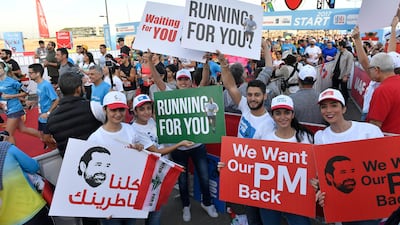Political colleagues of Saad Hariri, who resigned more than a week ago as prime minister of Lebanon, have declared their support of Saudi Arabia’s government.
A statement released by Mr Hariri's Future Movement said: “The Future parliamentary bloc condemns any campaigns against Saudi Arabia and its leadership. These campaigns are part of a plan to sabotage national stability, and it stresses the brotherly relations with the Kingdom. ”
The statement was made public on Saturday evening after a meeting of party officials, even as other Lebanese politicians continue to accuse the Saudis of placing Mr Hariri under house arrest and coercing him into stepping down as prime minister.
It has been more than a week since Mr Hariri travelled to Riyadh and then suddenly resigned from his position, a move that appeared to surprise even his inner circle. Except for a short trip last week to meet with leaders of the United Arab Emirates in Abu Dhabi, he has remained in Saudi Arabia since then.
Saudi Arabia has long been a supporter of Lebanon’s Sunni community and the Lebanese government more generally. But the Saudi leadership appears intent on making Lebanon part of its regional proxy war against Iran.
The Saudis and Iranians already back opposing factions in the ongoing wars in Syria and Yemen. The Iranians have greatly increased their influence in Iraq by supporting militia forces that have aided the Iraqi government in its successful fight against ISIL while the Saudis support Bahrain’s government, which has been struggling to quell a Shiite uprising that both Bahrain and the Saudis say is driven by Iran.
The speech Mr Hariri gave from Riyadh, which was first broadcast on Saudi-owned Al Arabiya, excoriated Iran’s role in Lebanon and its support for Hizbollah, the Shiite political party and militia that has become an essential part of the Lebanese government while at the same time maintaining the ability to operate independently of the Lebanese state.
Hizbollah is by far Iran’s most effective proxy, and its role in Syria’s civil war, fighting on behalf of the government there, has greatly strengthened its military capabilities.
“The bloc reaffirms its unequivocal rejection of Iranian interference in the affairs of the brotherly Arab countries and considers it a factor in fuelling strife, conflict and wars in our region. It condemns the attacks targeting the Kingdom by Iran's tools in Yemen and elsewhere and calls for curbing these attacks and interventions,” said the statement from the Future political bloc.
On Sunday morning, Lebanese journalist Paula Yacoubian announced that she was travelling to Riyadh to interview Mr Hariri. Ms Yacoubian hosts a talk show on Future TV, a Beirut-based station that was founded by Mr Hariri’s father.
The latest developments did little to answer questions surrounding Mr Hariri’s resignation and where Lebanon will go from here. His resignation from the post of prime minister brought to an end a year of relative calm in Lebanese politics that saw the Future Movement and Hizbollah build a consensus government while leaving long-standing disputes, such as Hizbollah’s possession of arms, unresolved.
Hizbollah and Future Movement politicians alike also called for Mr Hariri’s return last week and said that he would remain prime minister until he came back to Lebanon and submitted his resignation in person.
“It’s hard to tell whether this latest hawkish statement indicates an end to Lebanese unity or suggests some kind of deal has been made with Saudi,” said Amal Saad, a professor of political science at Lebanese University.
“The statement was unnecessarily sycophantic and hostile towards Iran, overly defensive of Saudi despite the party implicitly accusing it of kidnapping its leader, so this could suggest that it was designed as a face-saving device for Saudi, an exit strategy of sorts to de-escalate,” Ms Saad added.
For some, the current turmoil is a reckoning that was unavoidable.
"We knew it would happen at some time, despite all the attempts to isolate Lebanon as much as we could from the fires in the region and to convince Hizbollah that it is time to moderate its stance and be more Lebanese than Iranian," said Mustapha Allouch, a member of the Future Movement's political bureau.
He downplayed Saudi interference in Lebanese politics and reiterated his party’s opposition to Hizbollah and Iran’s role in the region.
“We are now focusing on the trivial things — whether Saad Hariri is held against his will, whether Saudi wants to divide the Lebanese,” Mr Allouch said. “We are missing the whole picture — we have a struggle in the region that has been going on for more than five years, especially in Syria.”
He rejected the idea that Saudi Arabia hoped to drive a wedge between Lebanese factions.
“The Lebanese do not need to be divided, in fact. We have been divided concerning Hizbollah for the last 20 years.”
In Beirut, the annual marathon turned into a pro-Hariri rally on Sunday as thousands of Lebanese used the event to appeal for Mr Hariri to return. He regularly took part in the marathon, giving the international sports event a big boost. This year, President Michel Aoun encouraged runners to call on Mr Hariri to return.
Spectators along the 42.2 kilometre course wore hats and held signs reading "Running for you" and "Waiting for you." Large billboards with pictures of Mr Hariri rose overhead, and a local TV station re-broadcast an hour-long profile and interview with him recorded last year.
One woman raised a placard reading: "We want our prime minister back."

